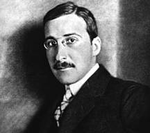No subscription or hidden extras
Read through all quotes from Stefan Zweig
Religion did not play a central role in his education. Zweig had a warm relationship with Theodor Herzl the founder of Zionism whom he met when Herzl was still literary editor of the Neue Freie Presse then Vienna's main newspaper; Herzl accepted for publication some of Zweig's early essays. Biography
Zweig was the son of Moritz Zweig (1845–1926) a wealthy Jewish textile manufacturer and Ida Brettauer (1854–1938) from a Jewish banking family.
At the height of his literary career in the 1920s and 1930s he was one of the most famous writers in the world.

